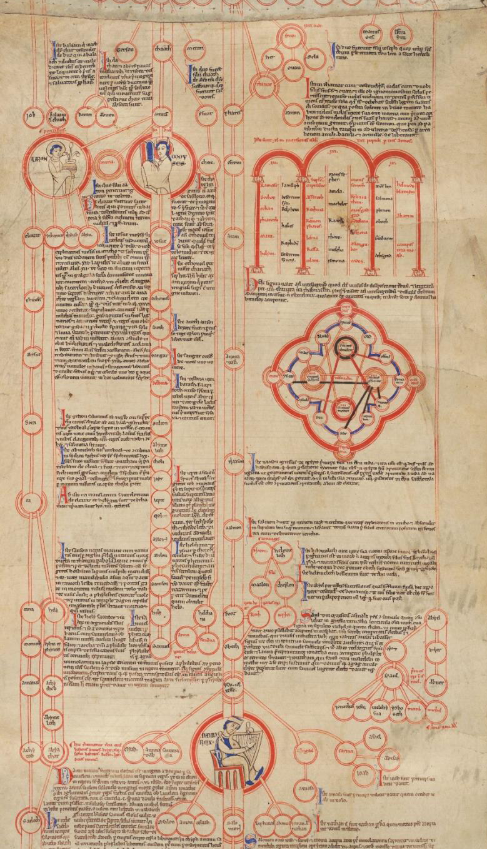The 12th century Parisian scholar Peter of Poitiers created a novel visualisation of salvation history in the form of a linear synopsis with brief textual explanations, the Compendium historiae in genealogia Christi. The sequence of generations from Adam to Christ forms the chronological leading axis with which the lines of biblical ruling families are correlated, so that synchronous and diachronic relationships of persons and events can be read simultaneously. Furthermore, the Compendium historiae visualises suggestively the basic assumption of a history that is ordered by God and can be grasped by the human mind in its order, that proceeds according to plan and teleologically. The synopsis developed by Peter of Poitiers quickly spread throughout the Latin West. Between the late 12th and early 16th centuries, several hundred copies have survived.
The interdisciplinary and international research project (with University of Tübingen, University of Wuppertal, University College London, Università Ca’ Foscari di Venezia) brings together the fields of art history, Latin philology, medieval history, edition studies and digital humanities. The aims are
(1) a comprehensive overview of the tradition of the Compendium historiae,
(2) an analysis of the graphic metastructure as well as the texts, diagrams and images embedded in it (and the recording of variants),
(3) a critical scholarly edition (based on selected witnesses), and
(4) an exploration of relevant contexts.
With the development of the digital edition, new methodological ground is being broken in terms of the adequate representation of diagrammatic structures through a formalised and navigable knowledge graph that represents the variants of the work as individual forms of realisation and transmission through innovative visualisation technologies. The project will make accessible one of the most visually innovative and influential works of the Middle Ages and shed new light on the history of the visualisation of knowledge. It will also provide a model with which works of complex graphic structure can be edited and made accessible in the future.

| Duration | 01.01.2023 - 31.12.2025 |
| Funding Funding program | FWF International |
| Grant amount | € 405.012,3 |
| Unit | Department of Digital Humanities |
| Profil area Uni Graz | Dimensions of Europe |
| Project investigator | Mag. Roman Bleier, MA PhD |
| Project staff | Sina Krottmaier, BA. BA. MA. Teresa Potenza, BA. MA. Jakob Sonnberger, BA. |
| Project homepage | compendium-historiae.uni-graz.at/en/ |